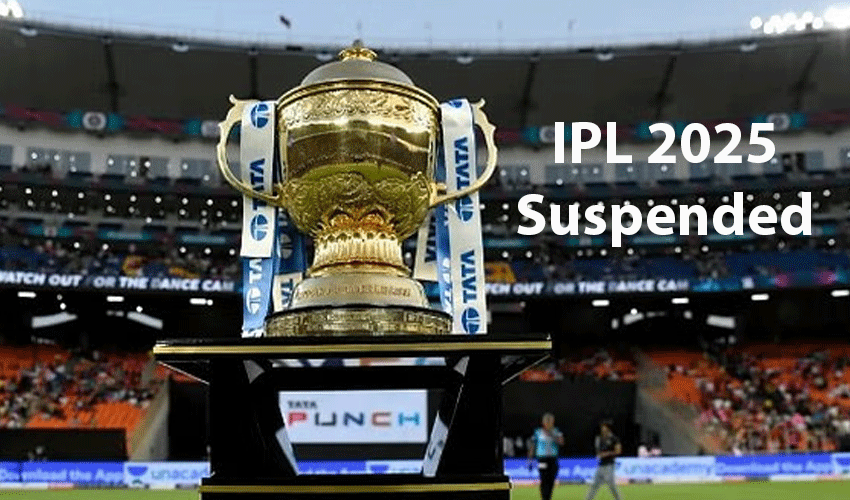The Indian Premier League (IPL) 2025 has been suspended indefinitely due to escalating security concerns following the military tensions between India and Pakistan.
The suspension came after the sudden abandonment of the Punjab Kings versus Delhi Capitals match in Dharamsala on Wednesday, which was halted due to alarming security risks.
The match, which was initially delayed due to rain, was brought to an abrupt halt when the floodlights at the stadium malfunctioned. What initially seemed like a technical glitch quickly escalated into a much more serious situation as players and officials were informed of air raid alerts being issued for nearby Pathankot, a region less than 100 kilometers away from Dharamsala.
As tensions between the two countries reached a boiling point, the safety of players, officials, and fans was brought into question, leading to immediate concerns from both the IPL governing body and the Board of Control for Cricket in India (BCCI).
Foreign cricketers’ safety concerns
While the match’s abandonment was initially attributed to the technical failure of the floodlights, a closer look revealed that the disruption was only a symptom of the heightened fears surrounding the region’s security. According to sources close to the IPL, foreign cricketers were particularly distressed by the rapidly escalating situation and expressed genuine concerns over their safety. Several foreign players reportedly asked for immediate arrangements to return home, fearing for their well-being in light of the ongoing military alert.
A player, speaking on the condition of anonymity, shared with The Indian Express that “the atmosphere in the dressing room was one of panic,” as both Indian and foreign players were informed of the air raid alerts. “For the foreign players, it wasn’t just about the match anymore; it was about their safety and getting out of the region as quickly as possible,” the player said.
Abandonment of Match
The crowd, which had filled approximately 80% of the stadium’s capacity, was evacuated immediately after the announcement regarding the security risks. As fans made their way out of the venue, some were seen shouting anti-Pakistan slogans, reflecting the tense political atmosphere and the heightened emotions in the wake of the escalating military situation. The decision to evacuate was made for the safety of everyone present, as security forces assessed the immediate risks posed by the air raid alerts.
The incident in Dharamsala has put the IPL under intense scrutiny, with questions raised about the tournament’s ability to continue amid growing concerns about player and spectator safety. The BCCI and IPL governing body, in an emergency meeting, made the decision to suspend the league until further notice, prioritizing the well-being of everyone involved over the commercial interests of the tournament.
Impact on IPL logistics
The immediate suspension of the IPL has had significant logistical repercussions. Flights to and from Dharamsala were suspended, and team buses were rerouted for safer exits as security forces intensified their presence in the area. The situation has disrupted not only the ongoing matches but also the broader operations of the tournament, with other teams now questioning whether they should continue to play in a country gripped by rising geopolitical tensions.
Despite the suspension, IPL Chairman Arun Dhumal expressed that the decision was in line with the BCCI’s commitment to ensuring the safety of all stakeholders. “We are deeply concerned about the situation,” Dhumal said in a statement. “While the league holds immense value to us and our fans, our priority remains the safety and well-being of the players, officials, and everyone involved. We are awaiting further government directives to understand the evolving security situation and to make informed decisions regarding the future of the tournament.”
Cancellation of upcoming matches
The immediate effect of the suspension was the cancellation of the next scheduled match between Lucknow Super Giants and Royal Challengers Bangalore, which was due to take place in Lucknow on Friday night. The match, along with others that were to follow, will not proceed until the security situation stabilizes.
Dhumal further clarified that the BCCI would continue to monitor the situation and would only resume the tournament when it is deemed safe for all involved. “We are in constant touch with government officials, security agencies, and the IPL’s governing body to ensure that we make decisions in the best interest of everyone’s safety,” he added.
The suspension of the IPL underscores the broader impact of geopolitical tensions on international sporting events. As one of the most watched cricket leagues in the world, the IPL is a major global spectacle, attracting foreign players, sponsors, and millions of fans. The ongoing military escalation between India and Pakistan has already cast a long shadow over the tournament, with foreign players expressing unease over traveling to a region gripped by uncertainty.
In a statement issued by several foreign cricketers, they stressed the importance of ensuring that all necessary safety measures are taken before considering the resumption of the tournament. “It’s not just about the game anymore,” one international player said. “It’s about making sure we are in a secure environment where we can focus on the sport, without fearing for our lives.”
The situation highlights a critical challenge for the IPL and its stakeholders, who now find themselves at the mercy of political and military developments that lie beyond their control. The BCCI’s ability to balance the commercial success of the tournament with the safety of its participants will be crucial in the coming days.
The Future of the IPL
As the IPL suspension enters its first 24 hours, the future of the tournament hangs in the balance. With foreign cricketers seeking assurances and fans left in limbo, the next steps for the BCCI will require careful consideration. The suspension of the IPL not only affects the immediate cricketing calendar but also raises questions about the viability of hosting international sporting events in regions affected by geopolitical instability.



